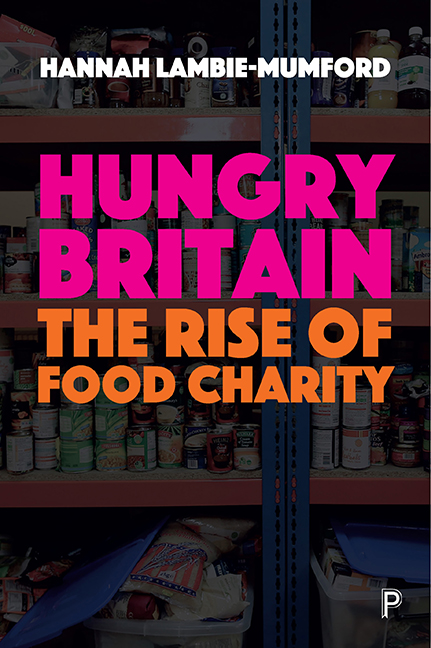Book contents
- Frontmatter
- Dedication
- Contents
- List of figures
- List of abbreviations
- Acknowledgements
- Foreword
- One Introduction
- Two Hunger and charitable emergency food provision in the UK and beyond
- Three Theories of the food insecurity ‘problem’ and the right to food ‘solution’
- Four Food charity: the ‘other’ food system
- Five The sustainability of food charity
- Six Food charity as caring
- Seven Food charity and the changing welfare state
- Eight Conclusion
- References
- Index
One - Introduction
Published online by Cambridge University Press: 05 April 2022
- Frontmatter
- Dedication
- Contents
- List of figures
- List of abbreviations
- Acknowledgements
- Foreword
- One Introduction
- Two Hunger and charitable emergency food provision in the UK and beyond
- Three Theories of the food insecurity ‘problem’ and the right to food ‘solution’
- Four Food charity: the ‘other’ food system
- Five The sustainability of food charity
- Six Food charity as caring
- Seven Food charity and the changing welfare state
- Eight Conclusion
- References
- Index
Summary
In the context of economic crisis, recession and austerity, charitable initiatives have emerged providing food to people in need on a widespread scale in the UK. The formalisation of this provision and its facilitation and coordination at a national level is unprecedented in this country, and raises important questions about what drives need for emergency food and how best to respond to that need. This book explores the recent rise of emergency food provision in the UK and its implications for ensuring everyone has access to adequate, appropriate food experiences.
The scale of charitable emergency food provision (voluntary initiatives helping people to access food they otherwise would not be able to obtain) has grown exponentially in recent years. In 2015–16, the Trussell Trust Foodbank Network – the UK's largest food-bank organisation – distributed 1,109,309 food parcels to adults and children across the country; an increase from 128,697 in 2011–12 (Trussell Trust, n.d.a). FareShare, the UK's largest redistributor of surplus food, now provides food to 4,652 charities (FareShare, n.d.a).
These years have also been formative for the emergency food movement in the UK in terms of public profile and political discourse. The Guardian (Moore, 2012) declared 2012 to be ‘the year of the food bank’, and hunger and the rise of food banks have been the subjects of articles and segments in many of the country's leading newspapers and on numerous television and radio stations (see, among many, Boyle, 2014; Channel 4 News, 2014; Morris, 2013; Mould, 2014). In the realm of national politics, food banks have been debated in parliament, have sparked the establishment of an All-Party Parliamentary Group and were the subject of a Parliamentary Inquiry in 2014 (Food Poverty Inquiry, 2014b; Hansard, 2013; Register of All-Party Groups, 2014).
The recent growth of food charity has occurred within a context of economic austerity and welfare reform. Public sector finances have been set on a programme of cuts, some of which are yet to kick in. An agenda of extensive welfare reform has introduced caps to entitlements and increased conditionality and an ethos of individualised risk.
- Type
- Chapter
- Information
- Hungry BritainThe Rise of Food Charity, pp. 1 - 8Publisher: Bristol University PressPrint publication year: 2017



